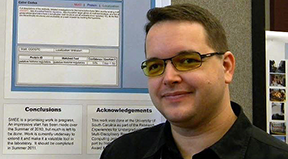Lewis

My name is Lewis. I am currently working on my PhD in computer science at the University of South Carolina. I earned my bachelor’s degree from the University of South Carolina and my associate’s degree from Midlands Technical College. Prior to that, I had experience as a network administrator and a database administrator.
My graduate research involves quantum computing and cryptography. These are interesting topics for many reasons. If we were able to build a quantum computer with the hardware implementation, it would be able to break most current cryptography. But it would also lead to provably secure cryptography. Through managing its implementation, we can ensure that law enforcement personnel gain access to the technology before criminals or terrorists. Quantum computers have a lot of other applications—including faster searching or calculations in fields like engineering and physics—that can help to improve the world around us. More specifically, my research involves the problem of linear algebraic "mutually unbiased bases," which can be applied to make quantum key distribution secure.
What are you going to do with your degree?
I would like to become a faculty member at a college or university, although I am concerned about the demands of a tenure-track position. Barring entry to academia, I could see myself working in a nice and preferably quiet research lab or directly serving my country by working on cryptography for the government.
Does your disability affect your career?
I have bipolar disorder. Put simply, my moods can vary, somewhat independent from outside causes and without my control. It means I can struggle to get out of bed at times and at other times I can be convinced that the most impossible of ideas are worth chasing after. The worst of my symptoms have been reined in by medication. The medication still leaves me with peaks and valleys, but being committed to staying ahead of the game helps me to be successful. Some people are embarrassed to seek help or worried about taking pills for the rest of their life for a "mental condition." Just because an illness is mental does not make it any less of an illness. I often compare it to being diabetic and needing insulin for the rest of your life. A diabetic has a disease and they take medication that allows them to live, function, and succeed. I do the same. Without the medication I have been prescribed, I would not be the successful graduate student I am today.
I have an aptitude for basic problem solving and critical thinking. I have found that my studies have helped hone these natural abilities. I would say the most important trait for a computing student is curiosity. To really stand out in a subject, you have to be willing to come up with ideas on your own and pursue them, instead of waiting for step-by-step instructions. If you come to a dead end or problem you can't solve, it’s important to keep trying and at least you’ll learn something from the process. As an undergraduate, I liked doing after-class research on topics I was learning about. This extracurricular study helped me discover my love of computer science and mathematics.
What can I do while I’m in high school if I want to pursue a career in computing?
It is never too early to start programming, and it can be quite fun. There are a number of great (free) resources available on the Internet to anyone interested in knowing more about computers and programming. Learning a basic scripting language to automate routing tasks is an indispensable skill in many computer professions. Most importantly, try to excel in math. Math promotes a way of thinking that is indispensable to advanced studies of computers.
Why should I study computing?
There are so many topics in the computing field that most people can find a niche they will enjoy. Almost any company or organization has system administrators or database administrators to keep computers and networks running. Mainframe administrators are still gainfully employed working on the "big iron" IBM machines, like the Watson computer that recently made such a splash by beating the most successful human contestants on Jeopardy. Computer engineers design computer hardware. Bioinformaticists use computational power to make sense of the enormous volumes of data generated by modern research into the genome, cell proteins, and diseases.
Computers are used directly or indirectly in almost all fields today, so there is always a demand for people who really understand them. Despite the slow economy, hardware and software companies like Apple, Microsoft, or Google are doing amazingly well. Although it is not always easy, computing is an excellent degree choice.